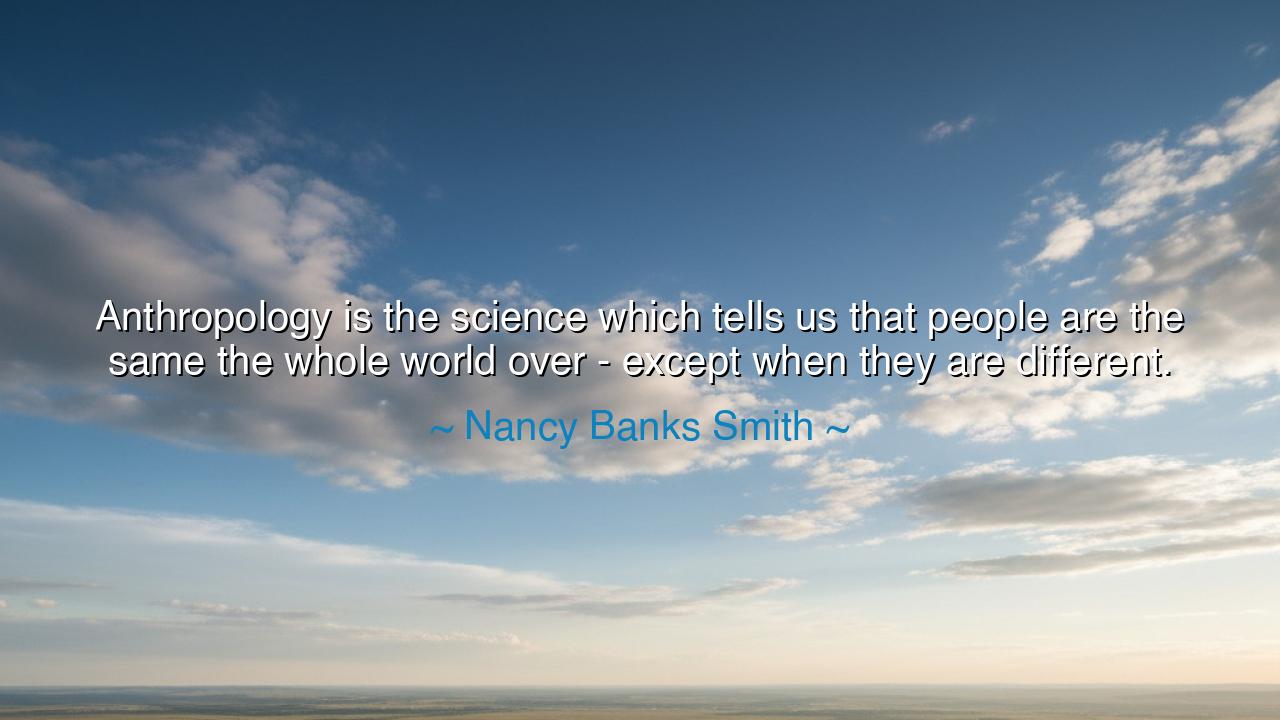
Anthropology is the science which tells us that people are the
Anthropology is the science which tells us that people are the same the whole world over - except when they are different.






Hear the witty yet profound words of Nancy Banks Smith: “Anthropology is the science which tells us that people are the same the whole world over—except when they are different.” What seems at first like a playful paradox carries within it the weight of wisdom about the human condition. It is both a jest and a revelation: that human beings share a common essence, yet clothe that essence in infinite variety.
The meaning is this: in all corners of the earth, people eat, love, work, worship, laugh, and grieve. These are the universal threads of humanity. Yet the ways they do so differ with astonishing diversity—different foods upon their tables, different gods upon their altars, different words upon their tongues. Anthropology, the discipline that studies mankind, reveals this dual truth: sameness at the root, difference in the branches. To forget either half of this paradox is to misunderstand the human story.
The origin of these words lies in the playful style of Banks Smith, a critic known for her wit. Yet beneath the jest lies a serious insight. Anthropology, since the days of Herodotus and later refined by scholars such as Malinowski and Lévi-Strauss, has revealed the duality of humankind. On the one hand, it shows us that the need for kinship, ritual, and meaning binds all societies together. On the other hand, it uncovers the dazzling variety of customs that makes each people unique. The humor of Banks Smith’s quote is in its simplicity, but its power lies in the truth it expresses.
History gives us examples that shine with this paradox. Consider the voyages of Marco Polo, who traveled from Venice into the courts of the East. He found spices, silks, and customs unknown to Europe, and yet he also saw families gathered around tables, rulers commanding armies, and priests guiding souls. The differences astonished him, yet the similarities reminded him that all people, however far, shared the same basic desires. Or recall the anthropological work of Margaret Mead, who studied youth and sexuality in Samoa. She discovered practices utterly unlike those in the West, yet her work also revealed the same universal struggles of adolescence, identity, and belonging.
The danger comes when we see only one half of the truth. Some see only sameness, erasing the beauty of cultures and traditions, forcing uniformity in the name of progress. Others see only difference, dividing humanity into alien tribes, forgetting that beneath language and ritual, every human heart beats with the same rhythm. To live wisely is to hold both truths in balance: to honor diversity while recognizing unity.
The lesson for us is clear: embrace the paradox of humanity. Know that beneath every foreign garment, every strange custom, lies a soul not unlike your own. And yet, do not dismiss the differences, for they are the colors that give the human tapestry its beauty. The traveler, the scholar, the citizen of the world—all must learn to look upon humanity with both recognition and wonder.
Practical action flows from this wisdom. When you meet another, seek the familiar in their eyes—the longing for dignity, the love of family, the need for hope. But also honor the differences in their ways of living, their traditions, their beliefs. Study cultures not to erase them, but to understand them. Teach children that to be human is to be both one and many, bound together by the same needs, yet flowering into endless forms of expression.
Take this as a guiding flame: “People are the same the whole world over—except when they are different.” Let it remind you that humanity’s greatness lies not in uniformity nor in division, but in the dance between the two. For in that dance, we see both our shared roots and our many branches, reaching together toward the sky.






AAdministratorAdministrator
Welcome, honored guests. Please leave a comment, we will respond soon